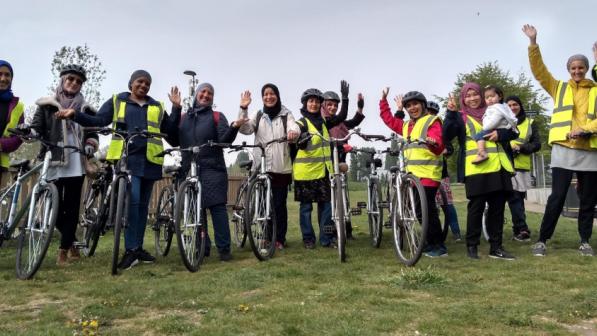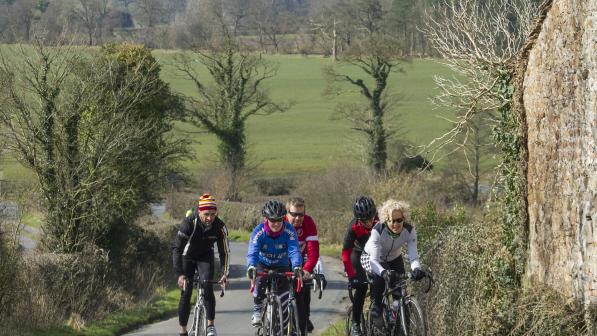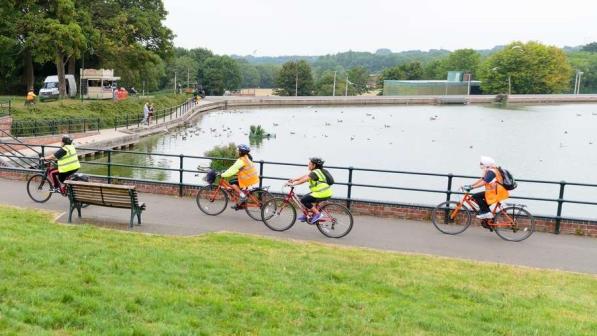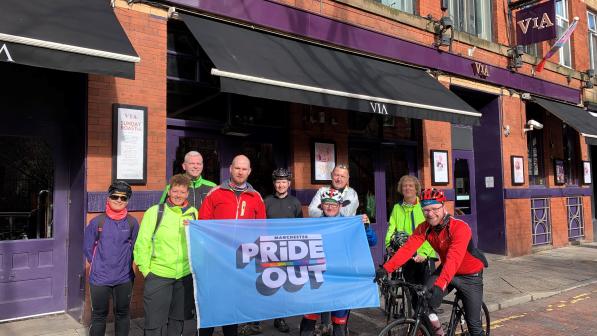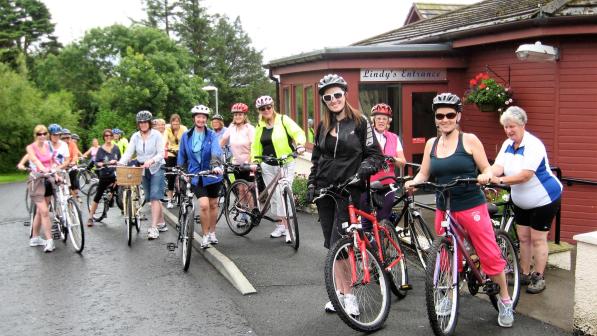How to set up and run a cycling group

Cycling on your own is great, but riding with a group means the fun is shared. You’ll also learn new skills and benefit from the mutual support and encouragement of riding with like-minded people.
What kind of cycling group are you?
Cycling groups come in many different shapes and sizes, depending on the type of cycling you’re interested in – whether that’s riding to work, a countryside bimble or an off-road adventure. The list below is not definitive; perhaps your own group fits into a category all of its own?
Bicycle User Groups (BUGs)
These groups are centred on a workplace or perhaps an educational establishment. The members of this type of group may all work together at the same site or at different sites but work for the same organisation.
They may use bikes to ride to and from work and, as a group, work together to improve conditions for cycle commuters at the premises. The members may also enjoy social cycling together and want insurance cover for the rides and events they organise, which may occasionally include members of the public.
Campaign groups
Do you have a particular local cycling issue you’re concerned about? Forming a campaign group is one way of lobbying for change by uniting all the cyclists in your area with one voice. You may also like to ride together too.

Social cycling groups
This is a group that puts on leisure rides and social events for a specific group of people. It may be based in a particular town or city, or around a particular activity such as touring or audaxes.
They tend not to organise competitive events such as racing or time trialling (which Cycling UK insurance doesn’t cover, although non-mass start events such as sportives are covered). Cycling UK’s member groups (see below) are exclusively this type of group, although many of them also offer a programme of mountain bike or off-road rides.
Women’s cycling groups
Perhaps you’d like to encourage more women to cycle as they are currently very much underrepresented in the cycling community. You could consider setting up a women only or female-friendly group, which may help get more women out on bikes.
Charity riding groups
These groups mainly put on fundraisers for a particular charitable cause such as air ambulances or protection of wildlife – or Cycling UK.
Mountain bike or off-road groups
Groups that ride mainly or exclusively off road or organise visits to bike parks and trail centres.

Community Cycle Clubs
These are groups that are formed in areas of identified need and may cater to particular groups underrepresented in cycling, for example ethnic minorities, women's groups, inclusive cycling centres, bike recycling centres and so on. Cycling UK supports many of these groups through our Community Cycle Clubs programme.
Facebook/Meetup groups
You may only communicate with each other online (apart from when on rides of course!) but that’s no reason why you shouldn’t become a formal cycling group. You would still benefit from the support and guidance of others.
Cycling UK member groups
A network of around 200 groups throughout the UK that provides a wide variety of cycling activities for Cycling UK members and, occasionally, the general public. Many of them have been in existence for around a century! They are almost all based around a particular town or region.
Cycling UK supports these groups with an annual grant and, in return, the groups provide us with a set of annual and financial returns and abide by the guidance in our Policy Handbook. You can join Cycling UK as a new member group. If you’d like more information before joining, please email [email protected].
Constitution
Once you’ve decided what kind of group you are, it’s time to create a constitution. This is a simple document that sets out the basics of how you would like to run your group. It could include, for example:
- The name of the group
- The purpose of the group – to raise funds, to campaign, to provide leisure rides and so on
- What kind of cycling you’ll be doing
- Who the group is aimed at: anybody or a particular group of people in a particular area?
- Whether or not you will charge a fee to join
- Whether you’ll have a committee to run the group and how often it will meet, how it will be voted in and so on
- Whether you’ll have an AGM and so on

Cycling UK can provide a sample constitution (attached below). Note: member groups use our Policy Handbook as a constitution.
Committee
Next, you will need to hold a meeting to elect a committee if you want one. Having one will make it easier to share out the tasks, as well as decide on a joint course of operation. We recommend a minimum of three people to form a committee, namely:
- Chair
- Secretary
- Treasurer
The committee may also cover roles such as publicity, membership, rides secretary, social events, club kit and welfare. We have a range of toolkits available to support these roles, which outline our recommended policies and procedures on things such as safeguarding, data protection and more.
The fun stuff
Now for the cycling bit…

You should already know what type of rides you’ll be offering. Decide if you’ll have a regular meeting place and day, who will lead the rides and whether you’ll organise social events as well.
Ride leaders should be deemed competent by at least two members of the committee: Cycling UK offers advice on best practice for leading rides, riding in a group, organising events and many other aspects of running a cycling club.
Publicity
Once you have an idea of who and what your group is, it’s time to put the word out about it. For this you can use Instagram, X, a Facebook page, website, Meetup or a combination of these.
Groups that join Cycling UK will have their own publicity page on our website, plus the facility to register their rides in our events listings, as well as access to all our other support, resources and guidance.
Join your group online
It’s easy to join your group online. If you have any questions, contact the Membership Team on 01483 238301 or email [email protected].
